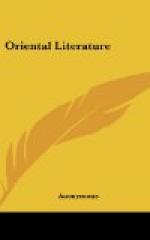When Haml finished these verses, the chiefs of the different tribes thanked him, and Hadifah having consented to accept the compensation offered, all the Arabs renounced violence and war. All who carried arms remained at home. Cais sent to Hadifah two hundred camels, six men-slaves, ten women-slaves, and ten horses. Thus peace was reestablished and every one rested in tranquillity throughout the land.
SELECTIONS FROM ARABIAN POETRY
[Translation by J.D. Carlyle]
INTRODUCTION
The essential qualities of Arabian poetry appear in the “Romance of Antar,” and the tales of the “Thousand and One Nights.” For such a blending of prose and verse is the favorite form of Arabian literature in its highest and severest form, even in the drama. But the character of the people is most clearly shown in the lyrical poems of the Bedouin country. The pastoral poetry of the peninsula is so local in its allusions that it cannot adequately be translated into English. It is in the lyrics that we find that “touch of nature which makes the whole world kin.” The gorgeousness of Hindoo literature, with its lavish description of jewelry and gold, precious stones and marbles, hideous demons, and mighty gods, is not to be looked for in Arabia. There the horizon is clear, and the plain has nothing but human occupants. The common passions of men are the only powers at work; love, war, sorrow, and wine, are the subjects of these little songs, some of which might have been written by “Anacreon” Moore, and others by Catullus. The influence of Greek poetry is indeed manifest in these light and sometimes frivolous effusions. The sweetness and grace which distinguish some are only equalled by the wit of others. For wit is the prevailing characteristic of Arabian poetry, which is attractive for its cleverness, its brightness, the alternate smiles and tears which shine through it, and make the present selections so refreshing and interesting a revelation of the national heart and intellect.




